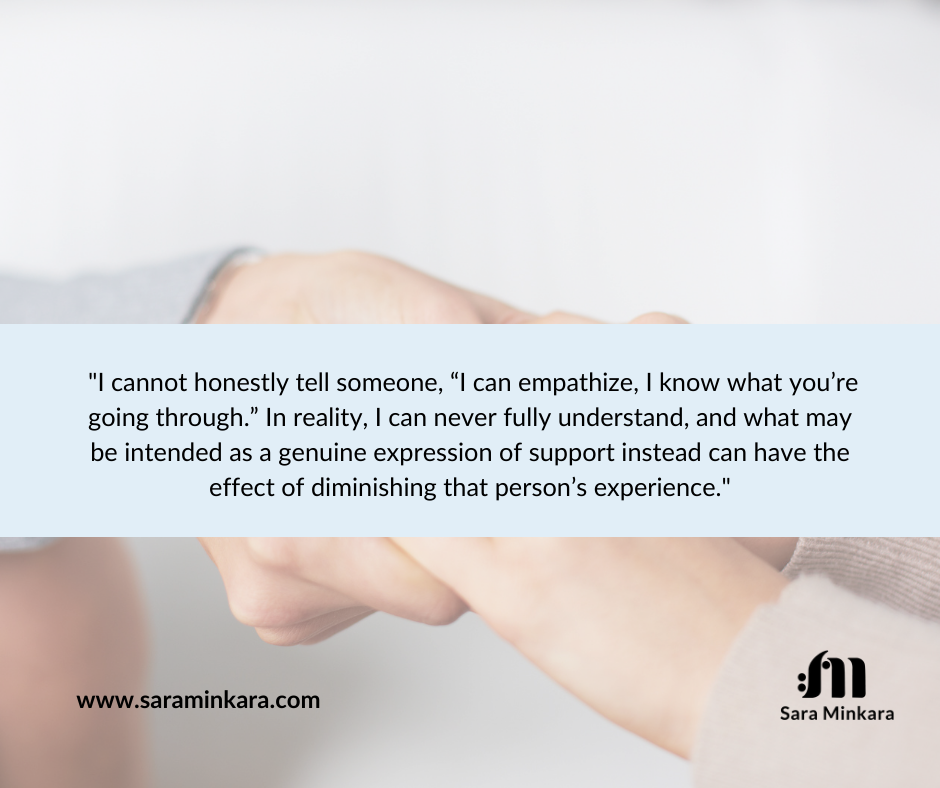Is Empathy a Bad Word
Empathy is the ability to understand and share in the feelings of another. It is frequently described as a matter of perspective, and a constructive approach to adjusting our own viewpoints to consider the impact on others. Through empathy, we can try to put ourselves in someone else’s shoes and imagine their experience. This is often considered a selfless, or at least, less selfish approach to connecting with others. We may use empathy to signal to someone that we understand what they are going through, that we recognize or relate to their struggle. Honoring someone’s experience by attempting to understand it is a way to validate that experience and show that you value the person behind the experience. But it can also serve exactly the opposite of its intended purpose, despite even the best of intentions. Rather than better understanding a person’s experience, we may ultimately end up erasing it, replaced with our own manufactured concept of their reality.
According to a BBC article by Richard Fisher, “research suggests that we ought to start making a clearer distinction between empathy and its apparent synonym: ‘compassion’. If empathy is about stepping into someone’s shoes, compassion is instead a feeling of concern for another person’s suffering which is accompanied by the motivation to help…to be compassionate, it does not mean you have to share somebody’s feelings. It is more about the idea of extending kindness towards others.”
This really resonates with me. I don’t believe any of us can ever truly know what another individual feels. We each move through life on our own paths, collecting different experiences along the way. Those experiences build upon each other, and they impact how we interpret the world around us. I cannot honestly tell someone, “I can empathize, I know what you’re going through.” In reality, I can never fully understand, and what may be intended as a genuine expression of support instead can have the effect of diminishing that person’s experience. So why do we so frequently respond with these broad statements of empathy or substitute our assumptions about what someone has endured? Of course reasons vary, but in general, human beings are social creatures by nature. We seek connection.
These reactions demonstrate that we care and we are listening, and are attempts to deepen those interpersonal connections. I gravitate more towards being curious through the lens of compassion rather than the artifice of empathy. Going straight to the source and asking a person to share their viewpoint allows for the most authentic answers and a true understanding of what that individual is going through and what they need or want. As a blind person, I can never fully understand what another blind individual is going through. As a woman, my experience does not precisely mirror that of any other woman. My life is not the same as my sister’s, who, like me, is both a woman AND blind. My struggles, my triumphs, my narratives, are just that…mine. They are personal to the experiences I have lived. Empathy is not inherently bad, but we have to be cognizant of the danger of inserting ourselves into someone else’s narrative. Copying and pasting what works for me to another person erases their story and dismisses their value.
As a disabled person growing up, many well-meaning individuals would pipe up with their version of, “You’re blind, I know exactly what you need.” Their intentions were often genuinely positive, at least from their own perspective. They believed they were doing something helpful. However in their presumption of empathy, I was robbed of the opportunity to actually say what I needed. People assumed they knew what I required because they tried to put themselves in my shoes or use what worked for someone else. When we attempt to “put ourselves in other’s shoes,” we risk removing them from the equation and, in turn, inserting ourselves through our manufactured concept of that person’s experience. Instead, choose empowerment over empathy. Respect their agency and give others the space to speak for themselves directly. Ask “what do you need?” or “what are you going through?”
That turns the table. It creates a sense of belonging, and allows for authenticity to be brought forward.
Trying to be empathetic doesn’t make you a bad person. Attempting to understand what someone is going through and being there for them IS NOT a bad thing. There’s just a better way to do it! Giving people the space they need to voice their needs or share their experiences is empowering. It invites them to embrace and share their truest selves and, in turn, untap endless value.
Article Source: https://www.bbc.com/future/article/20200930-can-empathy-be-bad-for-you#:~:text=Yet%20in%20recent%20years%2C%20researchers,them%20into%20aggression%20and%20cruelt


